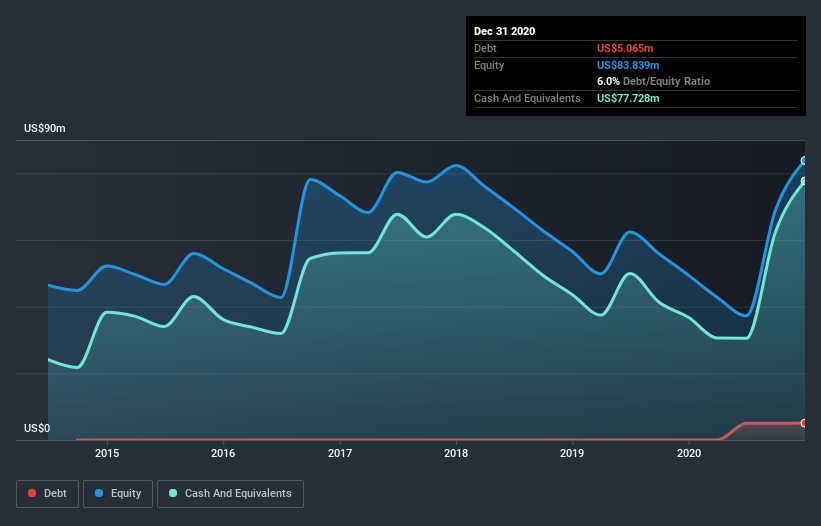- United States
- /
- Software
- /
- NasdaqGS:DMRC
Health Check: How Prudently Does Digimarc (NASDAQ:DMRC) Use Debt?

Warren Buffett famously said, 'Volatility is far from synonymous with risk.' So it seems the smart money knows that debt - which is usually involved in bankruptcies - is a very important factor, when you assess how risky a company is. We note that Digimarc Corporation (NASDAQ:DMRC) does have debt on its balance sheet. But the more important question is: how much risk is that debt creating?
When Is Debt A Problem?
Debt is a tool to help businesses grow, but if a business is incapable of paying off its lenders, then it exists at their mercy. If things get really bad, the lenders can take control of the business. However, a more common (but still painful) scenario is that it has to raise new equity capital at a low price, thus permanently diluting shareholders. By replacing dilution, though, debt can be an extremely good tool for businesses that need capital to invest in growth at high rates of return. When we think about a company's use of debt, we first look at cash and debt together.
Check out our latest analysis for Digimarc
What Is Digimarc's Net Debt?
As you can see below, at the end of December 2020, Digimarc had US$5.07m of debt, up from none a year ago. Click the image for more detail. But on the other hand it also has US$77.7m in cash, leading to a US$72.7m net cash position.

How Strong Is Digimarc's Balance Sheet?
According to the last reported balance sheet, Digimarc had liabilities of US$9.78m due within 12 months, and liabilities of US$3.41m due beyond 12 months. Offsetting these obligations, it had cash of US$77.7m as well as receivables valued at US$3.91m due within 12 months. So it actually has US$68.4m more liquid assets than total liabilities.
This surplus suggests that Digimarc has a conservative balance sheet, and could probably eliminate its debt without much difficulty. Succinctly put, Digimarc boasts net cash, so it's fair to say it does not have a heavy debt load! The balance sheet is clearly the area to focus on when you are analysing debt. But it is future earnings, more than anything, that will determine Digimarc's ability to maintain a healthy balance sheet going forward. So if you want to see what the professionals think, you might find this free report on analyst profit forecasts to be interesting.
Over 12 months, Digimarc reported revenue of US$24m, which is a gain of 4.3%, although it did not report any earnings before interest and tax. We usually like to see faster growth from unprofitable companies, but each to their own.
So How Risky Is Digimarc?
By their very nature companies that are losing money are more risky than those with a long history of profitability. And the fact is that over the last twelve months Digimarc lost money at the earnings before interest and tax (EBIT) line. Indeed, in that time it burnt through US$22m of cash and made a loss of US$44m. But at least it has US$72.7m on the balance sheet to spend on growth, near-term. Overall, its balance sheet doesn't seem overly risky, at the moment, but we're always cautious until we see the positive free cash flow. There's no doubt that we learn most about debt from the balance sheet. However, not all investment risk resides within the balance sheet - far from it. To that end, you should be aware of the 3 warning signs we've spotted with Digimarc .
When all is said and done, sometimes its easier to focus on companies that don't even need debt. Readers can access a list of growth stocks with zero net debt 100% free, right now.
If you decide to trade Digimarc, use the lowest-cost* platform that is rated #1 Overall by Barron’s, Interactive Brokers. Trade stocks, options, futures, forex, bonds and funds on 135 markets, all from a single integrated account. Promoted
New: Manage All Your Stock Portfolios in One Place
We've created the ultimate portfolio companion for stock investors, and it's free.
• Connect an unlimited number of Portfolios and see your total in one currency
• Be alerted to new Warning Signs or Risks via email or mobile
• Track the Fair Value of your stocks
This article by Simply Wall St is general in nature. It does not constitute a recommendation to buy or sell any stock, and does not take account of your objectives, or your financial situation. We aim to bring you long-term focused analysis driven by fundamental data. Note that our analysis may not factor in the latest price-sensitive company announcements or qualitative material. Simply Wall St has no position in any stocks mentioned.
*Interactive Brokers Rated Lowest Cost Broker by StockBrokers.com Annual Online Review 2020
Have feedback on this article? Concerned about the content? Get in touch with us directly. Alternatively, email editorial-team (at) simplywallst.com.
About NasdaqGS:DMRC
Digimarc
Provides automatic identification solutions to commercial and government customers in the United States and internationally.
Flawless balance sheet with concerning outlook.
Similar Companies
Market Insights
Community Narratives



